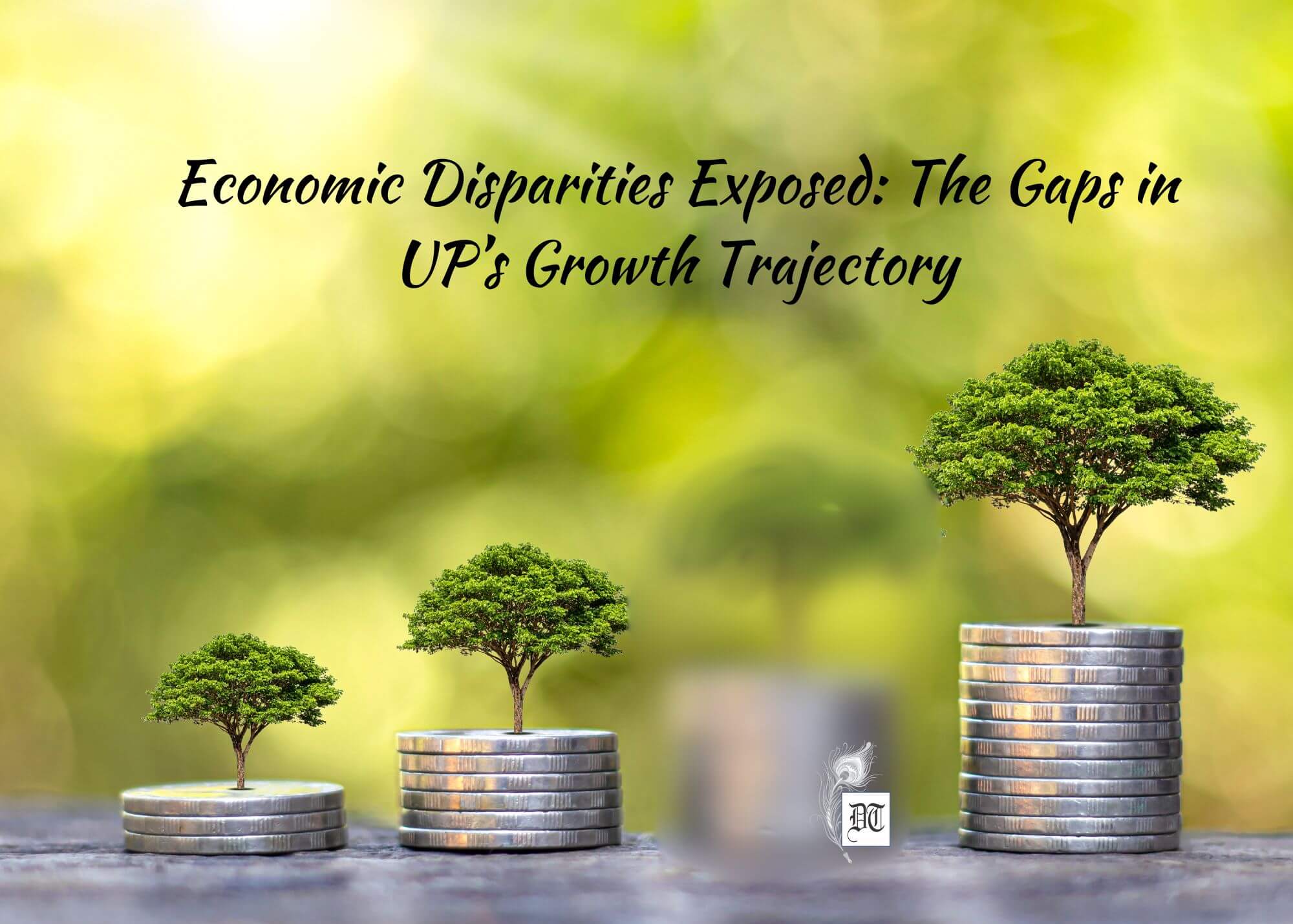Kalyan’s analysis highlights the challenges of transforming Uttar Pradesh into a one-trillion-rupee economy, urging for a collective, transparent, and accountable approach involving political representatives and citizens, an exclusive for Different Truths.
Macro- and micro-management are essential parts of running a government. In a large state like Uttar Pradesh, which is aiming for a one-trillion-economy, headed by a truly dynamic and disciplined leader, Yogi Adityanath, both sectors must run parallel and efficiently. The moot question is whether it is happening effectively. Does the trickle-down effect remain visible on the ground? Are smart cities making a difference in the lives of the common man? Let’s try to analyse the situation to understand the potholes on the road to a one-trillion-rupee economy.
The government’s macro work is visible and impressive.
The government’s macro work is visible and impressive. They also put in hard work to boost industrial growth through global summits, meetings with business leaders, and plans for a major film city. Airports, highways, rural connectivity, and railway facilities have been taken up at a frenzied pace and are visible. This means that the government means business when it comes to big projects and their effective implementation. This can be further interpreted as indicating that Lucknow is working efficiently. The CEO of the state manages the corporate office, and the team is delivering.
Does the same hold good for micro-management through branches, which are the cities and further sub-branches such as villages or rural areas? This is where the stumbling block is for a one-trillion-rupee-economy. The development, movement, and management are in sharp contrast to the projects being handled in Lucknow. It is visible that we are witnessing big megaprojects coming up and being executed in record time, but beneath such impressive shows are the slow, inefficient, and largely corrupt systems still existing and operating in the management of cities and villages. The Nagar Nigams, corporations, development authorities, power department, policing at the local level, transport department, health, and education both at the urban and rural levels are still lagging far behind the vision and mission of the Chief Minister of UP.
The reason for such a gloomy scenario is a long history of government control and interference, corruption, monopoly, unaccountability, and unprofessional work culture. There is a deep collusion between the political masters and the babus who serve them. The mindset is that they are made for each other and must work mutually for mutual benefit with no concern for the man on the street, and they are not accountable to the citizens of their area.
Let’s understand an example. A small stretch of road not in existence for years and causing acute difficulty for the citizens has caught the attention of a political leader who considers it a good effort for the citizens and believes it to be politically correct. The work is awarded to an identified contractor by the administration on the advice of the elected political leader. The work is executed, and bills are cleared. The locals for whom the road has been built have no idea what the specifications for the road are to be constructed, the length of the road to be constructed, or the desired quality.
The entire system works between the administration and the political system, and the common man is kept out of the loop.
Everything is a dead secret, and it would be a herculean task for a citizen of that area to get hold of the details of the work order. The entire system works between the administration and the political system, and the common man is kept out of the loop. And that makes this system a perfect ground for unaccountability and corruption. This is not an isolated case study.

There are several such glaring examples, whether it is harassment by the electricity department, the arrogance of the police department, the elusive character of top officers of districts and towns, touts dominating development authority offices, Nagar Nigam’s, Vikas Bhavans, state medical hospitals callous approach, or the state education department’s inability to deliver. This confirms that the macro- and micro-level wings are not in sync with the UP government’s aim and ambition towards making the state into a one-trillion-rupee-economy.
While the crime rate has come down, dreaded criminals have either been eliminated or put behind bars, and many noted criminals have fled for fear of state action. The moot question is who these criminals were. They were criminals by the state, for the state, and of the state. When they were in power, various political parties sponsored all these so-called big criminals. These mafias were acting at the behest of their political masters and plundered wealth with political patronage for mutual benefit. Therefore, the elimination of such criminal elements has more to do with the political setup of the state than relief for the common citizen.
The common citizen is more concerned with the indifferent and arrogant approach of the thana and police, who refuse to act on information about an upcoming problem and wait for a crime to happen. The role of police in the prevention of crime is pathetic, and their performance is dismal. Even if a crime is reported, the approach is laid-back, unprofessional, and loaded with vested interests. They only wake up and respond quickly if the issue raised involves an influential person in society. The common man does not normally figure on the priority list of the police department.
Complaints and repairs are a priority only for the influential section of society, and the common man continues to bear the brunt of total darkness.
Similarly, the common citizen is concerned with the electricity supply at his home. The state of the electricity department and its function are well known to everybody. From wrongly inflated bills to erratic supply, rickety, faulty machinery, skeleton manpower, and an inefficient system, today handles the most important arm of the state on which the progress of the economy depends a lot. Complaints and repairs are a priority only for the influential section of society, and the common man continues to bear the brunt of total darkness.
The Nagar Nigam is so indifferent to the plight of the common man that it has failed to address seasonal issues of water-based diseases or mosquito-linked diseases, which are prevalent every year and require preventive measures as well as effective control and management of the disease. The most obvious cause of this situation in Nagar Nigam is that most public representatives become bogged down by the babus of Nagar Nigam, and this unholy nexus compromises the developments of the town and cities, leaving the common man high and dry even after electing its representative.
The Nagar Nigam is so indifferent to the plight of the common man that seasonal issues of water-based disease or mosquito-linked diseases, which are rampant every year and need preventive actions and proper control and management of the disease, have failed to be addressed by the Nagar Nigam. The obvious reason for such a state of condition in Nagar Nigam is that most of the public representatives get bogged down by the babus of Nagar Nigam, and this unholy nexus compromises the developments of the town and cities, leaving the common man left high and dry even after electing its representative.
Development authorities are a cesspool of corruption. Constituted for the development of planned urban areas, these authorities have mostly colluded with builders, land mafias, and encroachers to create large tracks of unplanned and choking towns and cities, making life miserable for the common man. The situation of the regional transport department is a glaring example of mismanagement and corruption. Touts rule large in the department, and everything is possible for a fee to the touts and middleman. The result is untrained drivers causing serious threats to the people on the street, unfit and unlicensed vehicles on the road, and a rising graph of road accidents.
Far more painful is the situation with the government hospitals.
Far more painful is the situation with the government hospitals. Absent doctors, non-functional diagnostic labs and machinery, absence of critical medicine and equipment, and to top it all, even the basics such as the bedsheet and drip stand are not to be found. Dogs loiter inside the wards, and doctors are busy with private practice and running their own nursing homes. The common man is at the mercy of God.
The education department does not lag. Absent teachers, depilated school buildings, a lack of basic infrastructure, and a demotivated faculty in basic education Higher education in private colleges is a cartel of influential people and the education department. Mostly underpaid faculty or skeleton staff with missing students with the mere objective of accumulating fees and providing students with unfair means to pass their examinations, leading to a huge accumulation of educated, ineligible, and underqualified students every year from such private colleges.
The public distribution system (PDS) system, despite major reforms and checks and balances, needs much to be done. The gap between government sanctions and delivery to the poor and needy still exists and needs to be checked, with loopholes plugged in.
Beneath the gleaming airports and highways are neglected and inefficient networks.
Beneath the gleaming airports and highways are neglected and inefficient networks. The common man faces a difficult and suffocating existence in his daily life, despite the visible infrastructure like stadiums, convention centres, malls, markets, and multiplexes. It’s a terrifying situation for a state aiming to be a developed state and a role model for the rest of the country. It’s a herculean task to set so many things right within a short period, but until and unless things are set right, it will be one step forward and two steps backwards.
How much can we expect from an honest, hardworking Chief Minister? It must be a collective effort by the elected political representative of each constituency in association with their district officers along with people not from the privileged class but the common man, and a report card must be produced every quarter. Let a dedicated group of bureaucrats be assigned to monitor and aid each district officer in implementing the guidelines of the state executive, and strict accountability be set for both the district-level officers and the political representative.
The common man should be empowered to have a role in the decision-making…
The common man should be empowered to have a role in the decision-making towards the development of his town, city, and village and allowed to play the role of a monitor. We need to fulfil the mission and vision of the present-day government to make UP the growth engine of this country.
Picture design by Anumita Roy





 By
By

